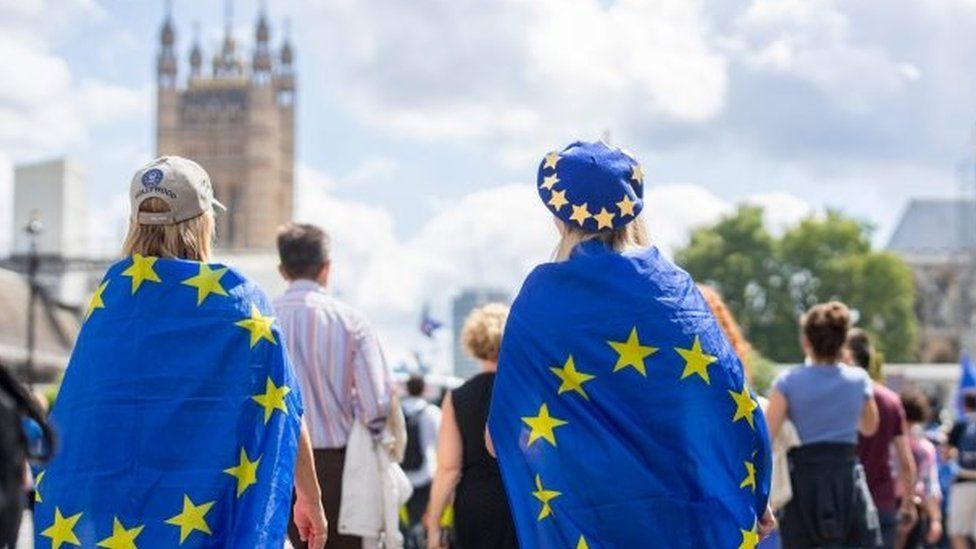Brexit sparks boom in applications for politics courses
- Published

The country remains deeply divided over the likely impact of Brexit, but one clear winner has already emerged - politics departments at universities.
There has been a 28% surge in applications to politics courses since the debate about Europe took off in the run-up to the 2016 referendum.
Applications went up by from 34,275 in 2013 to 47,445 in 2018 - according to the UCAS, which oversees admissions.
Liverpool University has trebled the size of its politics department.
That trend is largely reflected at institutions across the country and the number of students accepted on to politics courses in the five years to 2018 rose by 27% to 7,990, according to UCAS.
Liverpool University politics lecturer Jon Tonge says that other dramatic political events, such as the Scottish independence referendum and the 2015 general election, have also boosted applications.
And the fierce, often toxic, nature of the debate on social media has also captured the attention of young people, he said.
"It is a terrible thing to say, but the more unhealthy and divisive the debate is, the better it is for politics departments in terms of bums on seats," said Prof Tonge.
It is all a far cry from the Blair years, in the late 1990s and early 2000s, dubbed the "tranquil age of politics" by Prof Tonge, when "consensus" reigned and politics courses were "not recruiting in huge numbers".
Christopher Massey, a lecturer at Teesside University, which has just launched a BA (Hons) course in politics, agrees that Brexit has had a big impact on student numbers but Donald Trump's presidency and protest movements such as Extinction Rebellion have also played a part.
"You cannot avoid politics now - it has even ousted celebrity culture in the news headlines, as something that shapes their lives," he says.
'I enjoy the drama'
Ted Hollas and Harry Souter are A-level politics students at York College and both are hoping to study the subject at university.
Ted, 17, who describes himself as "right wing, but socially liberal", said: "I hear people saying they are so bored with Brexit but I am really interested in it. I follow every twist of it in Parliament and I enjoy the drama.
"I would like a career in politics. I want to get try to get in there and make a difference.
"I imagine its is very intimidating, and a lot of pressure, but I am not going to let that put me off."
Harry, 18, a self-described left-winger, said: "I got interested in politics through social media.
"When Brexit and Trump being elected happened there was so much more discourse about politics. Because people have such strong opinions you end up getting into it more. It feels more important.
"I like to know what I am talking about and studying politics helps with that. It is rewarding to be able to have a discussion with somebody and explain how you feel."
Tim Evans, professor of business and political economy at Middlesex University, says politics is a lot less predictable - and lot "messier" - than it used to be, and students do not fit neatly into categories like Leave and Remain.
"I think it's the most exciting time to study and to teach politics since the rise of the libertarian right in the 1980s and the collapse of the Soviet Union," he says.
But like other academics he is at pains to stress that Brexit is not the only game in town. Students are also looking to the global picture and issues such as climate change and artificial intelligence.
Robert Lamb, head of politics at Exeter University, says: "Our students have chosen to study politics because they are increasingly desperate to make sense of the tumultuous and bewildering times in which they live."
Others see Brexit as a narrow, parochial issue which can put young people off politics.
"The increase in interest in studying politics should not be seen only as a result of dramatic developments in British politics around Brexit but wider shifts in global politics," says Dibyesh Anand, Professor of International Relations and Head of the School of Social Sciences, at Westminster University.
"In fact, in our case, a very diverse student body has meant relatively tepid interest in British politics but a high interest in politics beyond Britain as well as international relations.
"To an extent, this could also illustrate a challenge British politics faces - it remains dominated by white men - and students from BME background, especially women, do not feel it is welcoming of them."